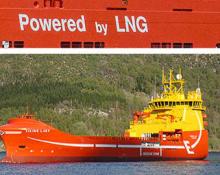Uwaga
Ten artykuł pochodzi z archiwum serwisu WWW i może nie spełniać kryteriów związanych z dostępnością definiowanych przez standard WCAG2.1AA.
As much as 96% of transport nowadays is dependent on oil, which, and that should not come as a surprise, will eventually run out. That is why it is important to find another, more long-term, and ideally as ecological as possible, fuel. The conference which took place on 6th November in Norway House in Brussels was an attempt to answer the burning question concerning the successor of oil as the fuel for ships. The event “Green Shipping – LNG as fuel for vessels” aimed at discussing and presenting LNG as the best possible option when it comes to vessel fuels. The conference, divided in two sections (“The potential for LNG in Europe” and “Experience and challenges with LNG”), tackled a wide scope of issues, such as supply and demand for LNG in Europe, its environmental potential and latest developments on LNG as fuel. What was stress during the presentations and debate, was the need for establishing clear-cut safety rules and legal acts concerning LNG. Since transport is so largely based on the running-out oil, ports and ships seem to be the best alternative, even though some might say that nowadays “vessels are only swimming garbage.” Using LNG as fuel could be a way to fix the problem, even despite the fact that it is still a fossil fuel. However, as the conference presented, such changes would require a number of systemic changes, including altering laws, adapting ports and creating new infrastructure. The latter seemed to be a particularly hot topic during the conference – everyone agreed that a properly adapted infrastructure is the first step to using LNG as fuel for vessels.
More information here.
